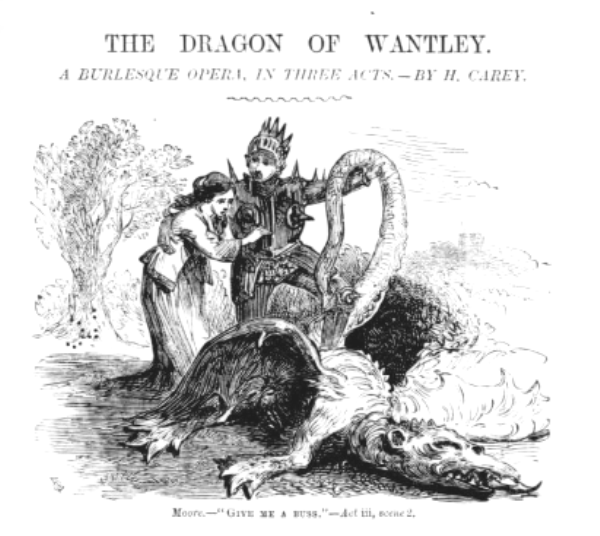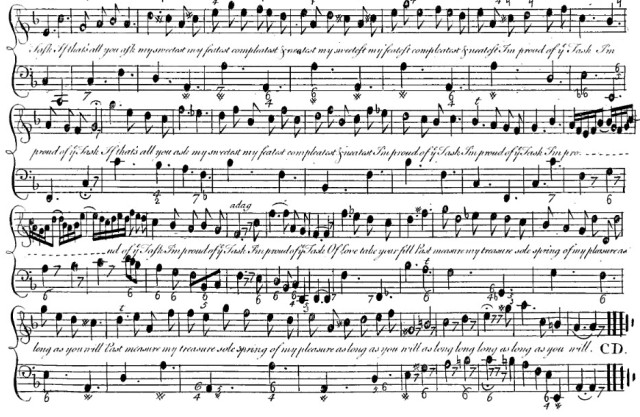Haymarket snares a fire-breathing send-up of Handel in naughty (and smart) Baroque farce

Bass David Govertsen is the foul-mouthed, all-devouring title character in Haymarket Opera Company’s vest-pocket production of ‘The Dragon of Wantley,’ a burlesque of serious opera in Handel’s day. (Photos by Ann Cillan, courtesy of Haymarket)
Review: “The Dragon of Wantley,” by Haymarket Opera Company at Studebaker Theater. ★★★★
By Nancy Malitz
John Frederick Lampe’s opera “The Dragon of Wantley” is a double send-up, which makes it ancient kin to Broadway’s “Spamalot.” The 1737 comic opera was based on a rustic Yorkshire legend about a dragon that devours children “as one would eat an apple,” and the monster’s slaying by a Falstaffian braggart and boozer who gets lucky with a sword. But “The Dragon of Wantley” is also a deadpan musical spoof of Handel, who was huge in London opera at the time.
The droll burlesque that bubbled out of the pit in a superb revival at the Studebaker Theater, under the auspices of Chicago’s vest-pocket Haymarket Opera Company, was reminiscent of a similarly subversive show that captured the spirit of Broadway in 2005: Andrew Lloyd Webber was, like Handel, a commercial juggernaut much envied, and thus target for ridicule. The 2005 “Spamalot,” which had its pre-Broadway run in Chicago in late 2004, mocked the heck out of the iconic Lloyd Webber song formula in “The Song that Goes Like This:” (A sentimental song/That casts a magic spell/They all will hum along/We’ll overact like hell ….)

Townsfolk encourage their hard-drinking Falstaffian ‘hero,’ that’s Moore of Moore Hall (Michael St. Peter) at far right, to drink drink up and go kill the dragon.
Back in 1737, “The Dragon of Wantley’s” creators were Handel’s much-less-famous colleagues, but everybody knew everybody in theater just like now. Composer Lampe played bassoon for Handel’s shows; Handel admired Lampe’s operas, it was said. Lampe’s librettist was Henry “Namby Pamby” Carey, who also wrote music and lyrics under the pseudonyms Benjamin Bounce and Signor Carini, delivering subtly subversive satire as the British government was cracking down.
Eventually Lampe and Carey went gung ho for English-language opera — no more dreary royal sagas, nor castratos, nor Italian language “roario oratorios” as they’re specifically mocked in this show. If these two didn’t entirely succeed in their mission to transform opera with the British mother tongue, at least Lampe would live long enough to see Handel set some major works in English, too.
It was great fun to witness “The Dragon of Wantley” in Haymarket’s rough and ready production conducted by Craig Trompeter and directed by Sarah Edgar. Perfectly fluent and often gorgeous music in the Handelian style, which would have done well in heroic opera or church hymn, was put in service of flatulence and farce, catfights, booze and sexual dalliance in naughty rhyme.

‘Give me a buss,’ says lusty Moore to one of his damsels, in the illustrated ‘Dragon of Wantley’ libretto by Dick’s Books, a penny publisher in 18th century London. (Wiki Commons)
The exuberant cast, costumed by Meriem Bahri as if the line drawings of a mad 18th-century sketcher had come to life, featured bass David Govertsen in the title role of the foul-mouthed, all-devouring Dragon. He shows up at the end in a winged reptilian costume that’s part toy horse. Set designer Zuleyka Benitez gave the whole a flattened shadow box look, with objects of importance such as mugs of ale much exaggerated in size.
Ale is of great attraction to Moore of Moore Hall, the Falstaffian “hero” who is flattered by the townsfolk into going after the dragon. The scene at Moore Hall has two numbers at the hilarious extreme: First, they all drink to the notion that “Zeno, Plato, Aristotle, all were lovers of the Bottle,” which is more or less the show’s Hallelujah Chorus.
Then, Moore names his dragon-killer fee, which is to bed comely Margery, who instantly agrees, it being for a good cause.

Moore of Moore Hall (tenor Michael St. Peter), indulges lustily in pleasure. He agrees to kill the dragon in return for a tryst, which sparks jealousy in Yorkshire.
Their song of bliss seems at first like proper stuff but the music couldn’t be more fervidly, ecstatically purpose-driven. Tenor Michael St. Peter and soprano Kimberly McCord, warm and sweet till they turned up the heat, are surely no strangers to this sort of sly comedy. Nor was Jory Vinikour, whose flourishes were like italics and exclamation marks, echoing a bevy of gifted double reeds and strings under the direction of Trompeter, who added their wherewithal to tunes like this:

Enamored Margery succumbs to Moore’s seduction enthusiastically in the spirit of the dragon-killing cause. She sings, as partially shown above, “If that’s all you ask, my sweetest, my featist compleatist and neatist, I’m proud of the task.” (Score via imslp.net)
Moore gets away with a lot, but his night in the sack with Margery does have consequences, on account of his being betrothed to Mauxalinda, who discovers this. First, the betrayed damsel sings how her (corset) stays will burst with sobbing, and then she gets into an over-the-top insult duel with Margery. Mezzo-soprano Lindsay Metzger, as this “other” lass, was fierce and very funny in fight mode, then quick as Chicago weather to melt when Moore convinces her to forget about it because they’re still betrothed: “Pigs shall not be so fond as we.”
“The Dragon of Wantley” remained popular throughout England for nearly fifty years, and as Haymarket Opera demonstrates, it was a treasure, if now largely forgotten. Dick’s Books, a popular printer of hundreds of stories, plays and poems, listed “The Dragon of Wantley” in the company of other works tragical, comical, pastoral-comical, tragical-historical, etc., at the same egalitarian price, including a scrivener or two whose price has since risen:

From ‘Richard III’ to ‘Rule a Wife & Have a Wife,’ Dick’s Books, publisher of ‘The Dragon of Wantley,’ would sell it to you for a penny. (Wikisource.org)
Related Links:
- Haymarket Opera’s season continues: For details go to Haymarket.org
- Sample the traditional 17th-century legend of the Dragon of Wantley: Go to Wiksource.org
- Read more on the legend’s development: Go to exclassics.com

